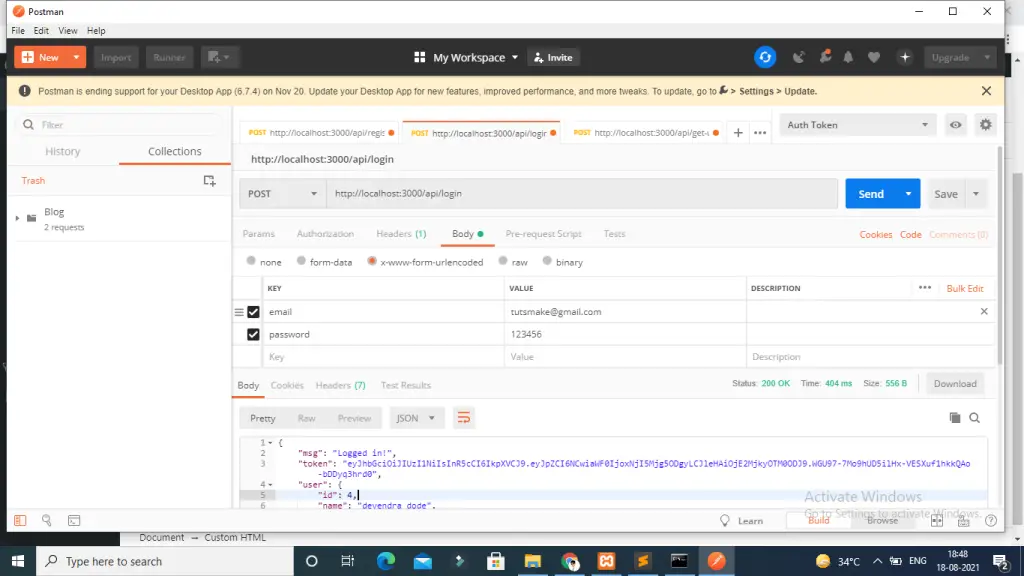In this tutorial, you will learn how to create user login authentication REST API in node.js + express + MySQL with jwt auth.
Node js Express Login REST API with MySQL Example
Steps to create login rest API in node js express with MySQL:
Step 1 – Create Database And Table
Execute the following command on terminal to create database and table:
CREATE DATABASE node-app CREATE TABLE users ( id int(11) NOT NULL AUTO_INCREMENT, name varchar(50) COLLATE utf8mb4_unicode_ci NOT NULL, email varchar(50) COLLATE utf8mb4_unicode_ci NOT NULL, password varchar(200) COLLATE utf8mb4_unicode_ci NOT NULL, PRIMARY KEY (id), UNIQUE KEY email (email) ) ENGINE=InnoDB AUTO_INCREMENT=4 DEFAULT CHARSET=utf8mb4 COLLATE=utf8mb4_unicode_ci;
Step 2 – Create Node Express js App
Execute the following command on terminal to create node js app:
mkdir nodejs-auth-rest-api-mysql cd nodejs-auth-rest-api-mysql npm init -y
Step 3 – Connect App to Database
Create dbConnection.js file into your app root directory add the following code into it to connect your node js express app to database:
var mysql = require('mysql');
var conn = mysql.createConnection({
host: 'localhost', // Replace with your host name
user: 'root', // Replace with your database username
password: '', // Replace with your database password
database: 'my-node' // // Replace with your database Name
});
conn.connect(function(err) {
if (err) throw err;
console.log('Database is connected successfully !');
});
module.exports = conn;
Step 4 – Install express and required Modules
Execute the following command on terminal to install express express-validator mysql body-parser jsonwebtoken bcryptjs cors into your node js express app:
npm install express express-validator mysql body-parser jsonwebtoken bcryptjs cors --save
- Express — Express is a minimal and flexible Node.js web application framework that provides a robust set of features for web and mobile applications.
- Express-validator — Express Validator is a set of Express. js middleware that wraps validator. js , a library that provides validator and sanitizer functions. Simply said, Express Validator is an Express middleware library that you can incorporate in your apps for server-side data validation.
- MySQL — MySQL an open-source relational database management system (RDBMS).
- body-parser — Express body-parser is an npm library used to process data sent through an HTTP request body. It exposes four express middlewares for parsing text, JSON, url-encoded and raw data set through an HTTP request body.
- jsonwebtoken — This module provides Express middleware for validating JWTs (JSON Web Tokens) through the jsonwebtoken module. The decoded JWT payload is available on the request object.
- bcryptjs — The bcrypt hashing function allows us to build a password security platform that scales with computation power and always hashes every password with a salt.
- cors — CORS is a node.js package for providing a Connect/Express middleware that can be used to enable CORS with various options.
Step 5 – Create Server.js File
Create server.js file and import express express-validator mysql body-parser jsonwebtoken bcryptjs cors into your server.js file; as shown below:
const createError = require('http-errors');
const express = require('express');
const path = require('path');
const bodyParser = require('body-parser');
const cors = require('cors');
const indexRouter = require('./router.js');
const app = express();
app.use(express.json());
app.use(bodyParser.json());
app.use(bodyParser.urlencoded({
extended: true
}));
app.use(cors());
app.use('/api', indexRouter);
// Handling Errors
app.use((err, req, res, next) => {
// console.log(err);
err.statusCode = err.statusCode || 500;
err.message = err.message || "Internal Server Error";
res.status(err.statusCode).json({
message: err.message,
});
});
app.listen(3000,() => console.log('Server is running on port 3000'));
Step 6 – Create Validation.js, Router.js and dbConnection.js
Create validation.js and router.js. So visit your app root directory and create this files.
Then add the following code into your validation.js file:
const { check } = require('express-validator');
exports.loginValidation = [
check('email', 'Please include a valid email').isEmail().normalizeEmail({ gmail_remove_dots: true }),
check('password', 'Password must be 6 or more characters').isLength({ min: 6 })
]
Then add the following code into your router.js file:
const express = require('express');
const router = express.Router();
const db = require('./dbConnection');
const { signupValidation, loginValidation } = require('./validation');
const { validationResult } = require('express-validator');
const bcrypt = require('bcryptjs');
const jwt = require('jsonwebtoken');
router.post('/login', loginValidation, (req, res, next) => {
db.query(
`SELECT * FROM users WHERE email = ${db.escape(req.body.email)};`,
(err, result) => {
// user does not exists
if (err) {
throw err;
return res.status(400).send({
msg: err
});
}
if (!result.length) {
return res.status(401).send({
msg: 'Email or password is incorrect!'
});
}
// check password
bcrypt.compare(
req.body.password,
result[0]['password'],
(bErr, bResult) => {
// wrong password
if (bErr) {
throw bErr;
return res.status(401).send({
msg: 'Email or password is incorrect!'
});
}
if (bResult) {
const token = jwt.sign({id:result[0].id},'the-super-strong-secrect',{ expiresIn: '1h' });
db.query(
`UPDATE users SET last_login = now() WHERE id = '${result[0].id}'`
);
return res.status(200).send({
msg: 'Logged in!',
token,
user: result[0]
});
}
return res.status(401).send({
msg: 'Username or password is incorrect!'
});
}
);
}
);
});
module.exports = router;
- login route – When you call this route on postman app with email and password; it will return jwt token. Which is used to call get-user method.
Step 7 – Start Node Express Js App Server
Execute the following command on terminal to start node express js server:
//run the below command nodemon server.js after run this command open your browser and hit http://127.0.0.1:3000/api/login
Step 8 – Test Rest Apis with PostMan App
Test node js experss + mysql user login api with Postman app:
Test node js experss + mysql user login api with Postman app:
POST - http://localhost:3000/api/login

Conclusion
node js rest api login with mysql and express js jwt auth; Through this tutorial, you have learned how to build user authentication REST Api in node.js + express + mysql with jwt.